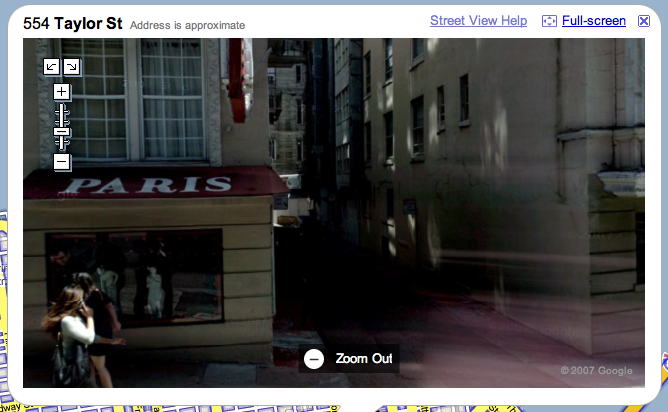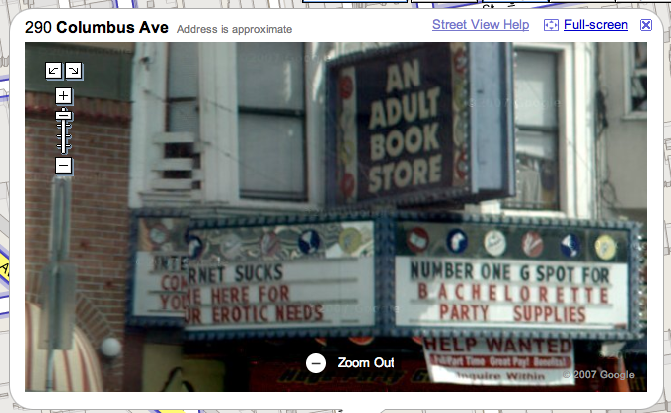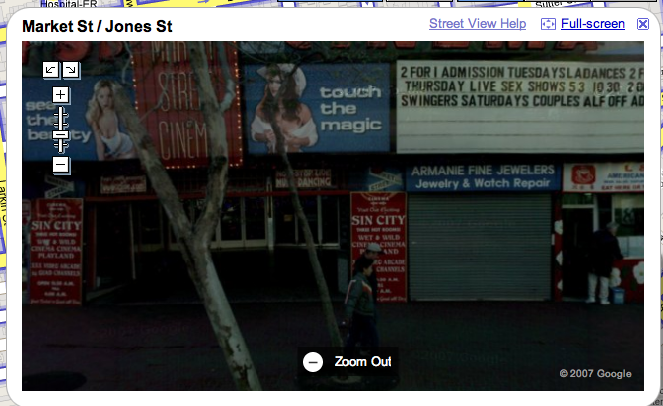Monday, July 30, 2007
Sex 2.-OH NOES!!1!!!
filed under: Web Sex Index, We Are The Sex Media, Pomoerotic by Melissa Gira | 3 Comments
![]() Nobody’s famous!, is really all the headline ought to have read in the Times (UK)’s latest technology bit on internet celebrity. Of course, we know that the virtue in having total, always-on infamy available to everyone (oh, except those pesky people still living without highspeed web access or GPRS, or cameras, or computers, how dare they) is that if everyone’s famous, aren’t we all liberated by the flattening effect that nobody is?
Nobody’s famous!, is really all the headline ought to have read in the Times (UK)’s latest technology bit on internet celebrity. Of course, we know that the virtue in having total, always-on infamy available to everyone (oh, except those pesky people still living without highspeed web access or GPRS, or cameras, or computers, how dare they) is that if everyone’s famous, aren’t we all liberated by the flattening effect that nobody is?
Oh, that, and when there’s no bogeyman left to trot out, sex still brings the terror, old school style:
In Web 1.0, human nature expressed itself primarily through lust and greed. Everybody was trying – and failing – to find new ways of making money, and delivering pornography was the main purpose of the web. Both are still present in Web 2.0, but they have changed. Making money, through online gambling and advertising focused on individual users, for example, exploits the new levels of interactivity. Pornography is now delivered with streaming video and, frequently, high levels of interactivity. In addition, there are now porn social-networking sites. You can post your home-made porn on one site and join in the fun as a voyeur on another. And there are endless sites offering the full 2.0 sex experience.
Immaturity break: omg, wrong, wrong, wrong!
First, fuck web 1.0, remember 1994? If you want titty, you’re on Usenet, plain and simple. Want “interactive” sex? Learn to spell, pervert, and hang in the hottub at LambdaMoo. Web 1.0 just organized this activity, with the addition of hyperlinking directories of some relatively decontextualized nudie photos, behind payment screens — oh, and removed most of the flesh and blood “hey, this could be a real girl!” thrill from much of online sex. But what also came forth, between the birth of the “click-here” age verification and the ashes of VISA deigning to accept most porn dollars?
Well:
Two, there has always been an online porn community. Porn communities, in the form of blogs, forums, and personal profiles, were the glue that held together the earliest alt.porn sites (no, not the big pink & black kid on the block). Thanks in no small part, I say, to porn, an internet generation came up around the notion that content was one thing, but conversation (I know, I know, that word!) was another. We may not all have wanted to talk to one another, but we did want to more efficiently find what we liked, and so that leads to “users” unveiling desire to one another through the safety of a screen in an actually new way. It was this community & conversation that lent the context to online sex that makes it hot, makes it (dare I say) real, and makes it easy to sell.
It’s not sex, but the context of sex, that’s bought and sold online. (A few varieties of commercial sex notwithstanding.) And really, I like to think there may have never been a Facebook were it not for nakkidnerds (unfortunate misspelling aside).
Oh, three! Unless you’re still marveling at your shiny new Zip disc, streaming porn probably no longer bears the frisson of La Nouvelle.
Lastly, the “full 2.0 experience”? Sir, you wouldn’t know what that was like, even if every A-list blogger that ended up in your bed turned from your dick in the pale light of morning to their Blackberry, grabbed the latest sycophantic proclamations of THE FUTURE OF THE INTERNET off of Twitter, and beat you about the balls with the baby blue screen.
Because for that sir, there’s a $5000 conference entrance fee, plus $1000 gratuity to the web-enabled domme of our sponsor’s choice.
(thx, and via, violet blue)
Tuesday, June 5, 2007
Sex, The Internet’s Own Wasteland
filed under: Web Sex Index, We Are The Sex Media by Melissa Gira | 2 Comments
![]()
The nymphs are departed.
And their friends, the loitering heirs of city directors;
Departed, have left no addresses.
- T. S. Eliot
I don’t mean to lay the blame at your feet, internet, but I am. How abysmal, how easy. In the morning there are sex bloggers on both America’s coasts (and in the middle, too, but there are fewer, or at least, fewer who say so) searching you for signs of intelligence, and just coming up pale and empty. For fuck’s sake, Technorati’s WTF? Sex has already been taken over with SEO rubbish, the fate of any social search tool that sex is allowed to traffic in (Yahoo killed theirs, and what of you, Mahalo?). Want to cry into your tea with less of a community of users driving your tears? Just customize your Google homepage to sex story feeds (here, I’m not territorial, are a few of mine: “sex study,” “sex research,” “sex science”) and read, weep, repeat. SEX NEWS IS BAD NEWS. Sex news tracked on the Web even more so. Sex news tracked by an untrained public? Just hand me my Hitachi and the handcrank generator, or something with enough batteries to get me off until the future arrives for real, please.
So what, then, would break through the internet wasteland of sex, where scandal passes for conversation and teaching people how to have an orgasm (so long as we don’t track your IP or tell your blogroll) and not get HIV is still seen as the apex of sex education? These are all still vital acts, yes, but they are not the whole picture of sex, not hardly. In fact, the more we focus on the endgame — coming, not dying — we lose the big picture, of why this information might be hard to come by in the first place.
What sex media would make a dent in this? Can sex media make a dent? Sex blogging at first seemed the answer: of course, people have been blogging sex since before blogging was blogging, and when blogging broke into genres — prematurely, I say, but of course, it brought advertisers with it — sex blogging itself went a bit stale. Is it good for the state of sex to just fill the web with more and more and more stories of all the ways we could, do, would fuck? Is it good for the state of sex to just say more — or ought we consider how to speak more smartly of sex?
Blogging is just a platform, blogging could be what we like, and FTW, Sexerati is not going to get all Andrew Keen on sex & the web, but what if it did? What if we dosed the sex web with a bit more erati – the gleeful elitism of sex that we supposedly dare not go there with? Sex is to be celebrated, sure, and people everywhere need better sex education, sex skill-building, sex comfort even.
But what else? Sex culture. Sex lit. Sex analysis. Sex theory. Sex happenings. Sex community.
Sex smarts, in other words, that fill the needs of not just the individual, but the sexual body politic. Sex that serves a civic duty, yes!
Sex that can be spoken from the rooftops and straight on through them, not just confined within a textfield.
There’s no argument that the internet has given rise to new sexual speech. Foucault, Sedgwick, Rubin, all would rejoice a little. Now, though, surrounded by new online sex acts each day, is it not time to apply a bit of a critical eye to how sexuality is produced by the internet? How we play a part in the production of sex in not just our reading, linking, and tagging, but in what we don’t even think to look for?
Thursday, May 31, 2007
Google: All Up In Your Offline Porn Searches, Too
filed under: Web Sex Index by Melissa Gira | Leave a Comment

![]() ana voog, o.g. camgirl and no stranger to acts of internet surveillance, points to these Google Map Street View shots of the entrances to porn stores and strip clubs in San Francisco.
ana voog, o.g. camgirl and no stranger to acts of internet surveillance, points to these Google Map Street View shots of the entrances to porn stores and strip clubs in San Francisco.
Not so much to track who is coming in and out of porn shops, here’s a few images I just searched on. Are we really approaching cite sexualite verite, or just creeping each other out? For some reason, I’m ready to give it up a bit to ‘Big Brother’ for the sake of making visible sex in all our cities:

Pink, Paris, Massage

Porn Store Says The Internet Sucks

Couples ‘Alf Off’
Wednesday, May 30, 2007
LiveJournal As Clueless About Who Sexually Abuses Kids As… Almost Everyone Else?
filed under: Web Sex Index by Melissa Gira | 1 Comment
![]() LiveJournal has deleted hundreds of journals and communities (a list in progress) in response to pressure by Warriors for Innocence, an Internet-based vigilante group with the predictably Dungeons and Dragons’-ish motto, “Hunting monsters on the Web.”
LiveJournal has deleted hundreds of journals and communities (a list in progress) in response to pressure by Warriors for Innocence, an Internet-based vigilante group with the predictably Dungeons and Dragons’-ish motto, “Hunting monsters on the Web.”
What was Warriors for Innocence and Six Apart’s criteria, then, for determining if a journal “promote[s] pedophilia, child sex, child abuse, and other illegal activities”? Warriors for Innocence claims that “sites were deleted by LJ because LJ (not WFI) chose to delete all sites with certain “interests” listed.” What interests were cited?
Child Rape, Child Molestation, Child Sex, Child Porn….
These are just a few of the “interests” that LiveJournal.com users name in their journals and profiles. Some are much worse and I won’t even print them here.
LiveJournal responded initially that they “regard the description of an illegal activity, an interest in an illegal activity, fantasizing about illegal activity, or even admitting to an illegal activity as something other than the commission of that activity. That is to say: writing a LiveJournal entry about having sexual attraction to minors is different than using LiveJournal to solicit a minor for sexual contact.” Now, three weeks and hundreds of “permanently suspended” accounts later? Says Warren Ellis of the fallout in LiveJournal communities:
The outcome, therefore, has been pure comedy, with comments that read very much like “I love spending all day reading about forced underage incestuous sex with squirrel fisting on top, but of course I’m not interested in that in real life — that’d make me a pervert!”
A protest community, the equally typographically & theologically tragically named innocence_jihad, has started in response.
CNET reports that LiveJournal had no legal liability to delete these accounts, which, at the time of their creation and until today, did not violate LJ Terms of Service. LJ user heidi8 writes:
As the Supreme Court said in Ashcroft v Free Speech Coalition back in 2002, in cases involving actual child pornography where real children are depicted in obscene contexts, “the creation of the speech is itself the crime of child abuse; the prohibition deters the crime by removing the profit motive…. Even where there is an underlying crime, however, the Court has not allowed the suppression of speech in all cases… We need not consider where to strike the balance in this case, because here, there is no underlying crime at all.
No. Underlying Crime. If no underlying crime exists, then how can LJ be concerned that they’ll be at “considerable legal risk” if pornish_pixies is allowed to list actions that are illegal in its interest list?
Which means that, with no legal imperative, and given that the pressure to make this move came from an organization that brags “we are not a non profit [sic] organization… [we] do not have a TOS,” and in an action orchestrated by all appearances by a “right-wing nut job” (thx, digg), could someone at LiveJournal/Six Apart have really believed that this mass deletion constituted a reasonable action to take in protecting children from sexual abuse? Why cave to the pressure of three Internet vigilantes? Sure, they say they’re talking to your advertisers, but…
Giving some extreme benefit of the mid-moral panic doubt to 6A, then, let’s just say that they believe that having a place for adults to publish stories about sexual activities that are harmful and illegal either stimulates said activities, or creates an opportunity for them to be committed, or they may believe that writing about and fantasizing about these activities puts children at risk enough that to even discuss these activities in written words is dangerous. But given that in 2004 in the United States, close to 95% of the perpetrators of sexual abuse on children were known to the children abused, the profile of the child sex abuser looks much more like a parent, relative, or caretaker — possible LiveJournal users, sure. Fanfic writers, maybe.
Where can we find these monsters?
Down the block, basically.
Child abusers, if only they were all scary Internet perverts we could smoke out just by looking at them at their LJ interests. Maybe in rodent-humping slash fiction the bad guy is always that easy to spot.
(Also, just to work my nerve, could the faux-daguerreotypes that Warriors for Innocence use to illustrate their blog entries scream pedophile any louder?)
Update, 2007.05.31: Six Apart’s Chairman and CEO, Barak Berkowitz, in Well we really screwed up this one, says, “We never intended this policy to cause the removal of journals that were have perfectly valid discussions about literature, law or culture. We never intended the policies to take down journals or communities clearly opposed to illegal activities but clearly we did… WFI or anyone else may complain but we are responsible for applying our policies to those complaints. Even idiots can be right about some things. We try not to judge the complaint by the source but rather judge them by our policies. I believe the problem here was not the complaints or the policies but our very poor execution.”
« go back — keep looking »Departments
- Dating 2.0
- Design for Sex
- Do It for Science
- Erotic Elite
- HOW TO:
- Jet Sex
- Lazysexweb
- Love & Other Glitches
- Music To Do It To
- Podcast: Future of Sex
- Pomoerotic
- Pop Futures
- Retrosexual
- Sex Hacks
- Sex Pop
- Sexerati Hearts
- Smart. Safe. Sex.
- SMS Livedating
- State of Sex Ed
- Strange Bedfellows
- The Morning After
- Theory Fetish
- We Are The Sex Media
- We Make Art Not Sex
- Web Sex Index
- Weekly Wrapup
